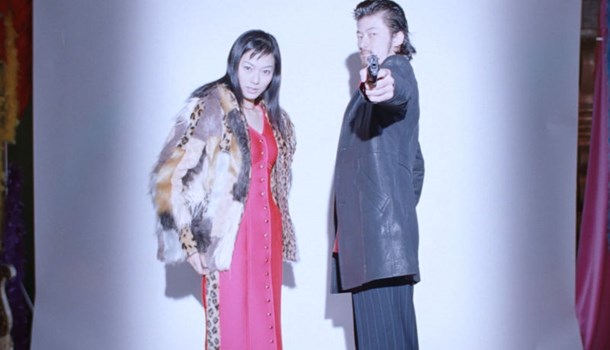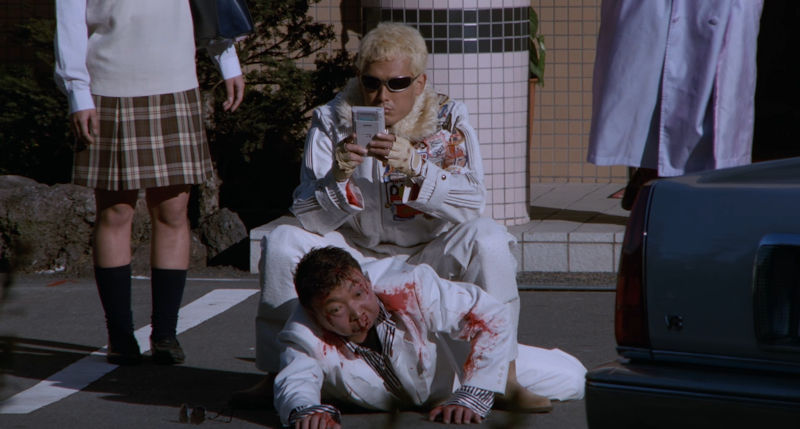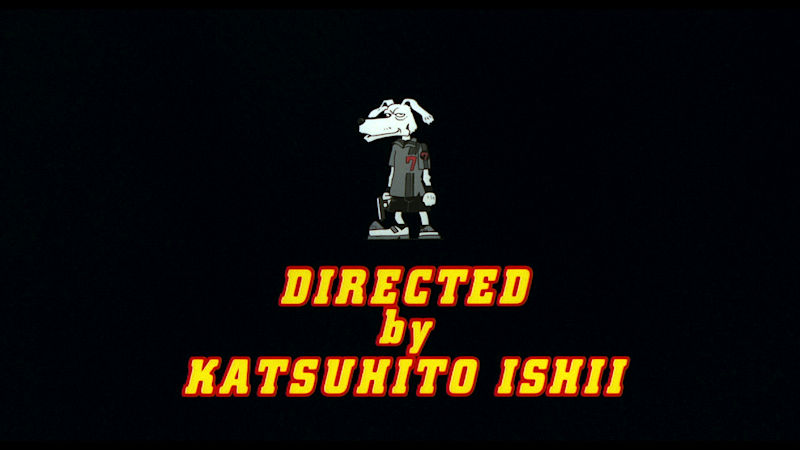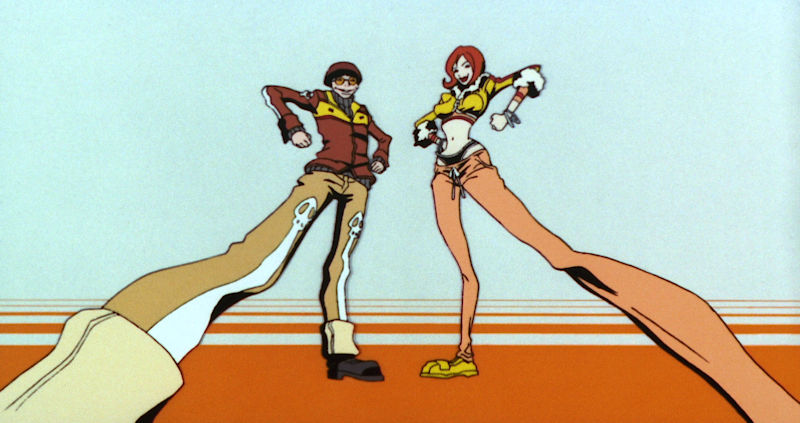
Written by Richard Durrance on 17 Jul 2023
Distributor Third Window • Certificate 15 • Price £44.99
Roll up! Roll up! Welcome to Part 1 of the Katsuhito Ishii Boxset review. Why Part 1?
Because I was lucky enough to head over to the Prince Charles cinema for a double-bill of Shark Skin Man and Peach Hip Girl + Party 7, and though the review discs have been sitting with me for some time I wanted to get the cinema experience first, so here I am starting you off with the Big Guns of the set. (PS, never sit in the middle rows of the basement seats at the PCC... the dip provides terrible neck ache.) Why Part 1? I didn’t want to totally word you to death with six films in one review [and pity my poor editor here, he’s a hard time enough without that much from me in one review].
But let’s get on with it, starting with Shark Skin Man and Peach Hip Girl (henceforth SSM&PHG to ease my tendonitis).
Samehada (Tadanobu Asano) has ripped off money from the syndicate and is on the run; Toshiko (Shie Kohinata) is also on the run from a creepy manager named Sonezaki (Yohachi Shimida) from the Hotel Symphony where she works, and who is obsessed with controlling her. Brought together by a car crash, they find themselves on the run from the syndicate, Sonezaki, and Yamada (Tatsuya Gashuin), a shy employee of the hotel who just also happens to be a contract killer.
SSM&PHG is a film all about style. A lot has been made of the influence of Tarantino, in part because Ishii was invited to create some of the anime sequences in Kill Bill as Tarantino enjoyed Party 7; and true, there’s some feel of Tarantino about it, especially to my mind the aspect of relying on style, but also how much both films exist in a vacuum and their tendency towards narrative digressions. Exactly why Samehada is stealing money from the yakuza (they call themselves the syndicate but they’re yakuza) never seemed to be fully explained, but it doesn’t really matter, because much of the story is a reason to have a series of intriguing characters and large dollops of cinematic style. You’re there to have fun and for a 110-miunte film there's masses of entertainment to be had. Also, Asano playing the lead role is always a major plus given his serious screen presence. But to be fair Ishii brings together a sharp cast of actors, even if for many you'll know the faces and not the names.
The style is cogently fused with great sound engineering and a cool music selection to make a film you’d struggle not to enjoy. In some ways the absolute apotheosis of the film comes in a great dress-up sequence, where Ishii beautifully marries visual energy with humour and style.

That said, there are some elements that are truly standout - the creepy hotel manager (the hotel also happens to be the yakuza hangout), is eerily disturbing. Even before we finally understand just how disturbed this man is, his coercive control of Toshiko is downright unnerving. Something in the icy detachment tells us more than arguably his denouement does, because the way in which Ishii has the character played makes you realise just how out of touch with reality he is, even manipulating the shy hitman-cum-hotel worker, Yamada effortlessly. You can see why Toshiko needs to climb out of high windows to escape this quietly psychopathic hotelier. Intriguingly you can argue that for this reason Toshiko is in some ways the character with the greatest sense of having a story and a motivation, though to be fair it takes a while for her character to fully come alive. It does make some sense that at first she might seem nervous, because she’s clearly been having to keep herself safe from the controlling manager, yet upon meeting and going on the run with Asano’s Samehada, she becomes more stylish, bolshy and a person in her own right. The yakuza trying to kill Samehada might share a surface gloss, nevertheless all exist as distinct people, whether the arrogant son of the boss lording over everyone and specialises in tasteless clothing or the friend of Samehada, who is struggling with going after his friend. The character dynamics are distinctive, building a more believable world rich with interesting characters that bounce off each other in intriguing ways.
One thing I loved was how, like Lynch and Tsukamoto, Ishii really paid attention to sound and editing. Like Funky Forest, Ishii uses jump cuts to great, sometimes comedic effect, but moreover he seems to know when to really use music and also sound, often low frequency to really suck you into what is going on. Considering the plot exists in its vacuum this really matters, as it keeps you always aurally in the film. Also, his focus on clothing, as he discussed at the Q&A, really matters, and every yakuza, and our couple of the run, have their own sense of style, even if in some cases it is gifted to them. So, there's style within what’s been shot and again in the energy of the direction and the post-production. There’s also a great title sequence, which has hints of his previous work in anime, which then goes full blown in the title sequence for Party 7, that reminded me a little of the anime Dead Leaves (and Panty and Stocking, With Garter Belt), though this could be my poor memory of it I admit.
Hmmm, could that be a segue into looking at Party7? You know it might just be.
A man with a suitcase he doesn’t want to let go of, Miki (Masatoshi Nagase), checks into a hotel at night, a hotel with some pretty odd staff. Shown to his room, his ex-girlfriend Kana (Akemi Kobayashi) barges in demanding money; meanwhile pervert peeper, Okita (Tadanobu Asano wearing the most atrocious jumper ever), and Captain Banana (Yoshio Harada) watch them through a false window as the events in the room unfold and others join them to make a party of seven.
As others bundle into hotel room, what’s clear is that this is a comedy. It also takes many elements of plot from the previous film - a suitcase that we find is full of money and yakuza chasing after it - but rather than taking place over a series of locations and a chase, Party 7 almost entirely exists in the hotel, excepting some flashbacks to a travel agency. It’s positioned more as an overt comedy, and with a definite focus on the humour. That it’s a more outrageous comedy is not surprising when you consider that Asano’s Okita has just been released from prison for watching women, is then taken in by his friend’s father who is equally a voyeur, and cosplays as Captain Banana; equally Kana who is the first to crash Miki’s hotel room happens to be his ex-girlfriend and the ex- of almost everyone who subsequently crashes it, excepting the one man who thinks she’s pure as the driven snow.

Oddly, I enjoyed Party 7 far more than I would have expected knowing it’s pretty much a two-room farce, and farce tends to rub me the wrong way. Like SSM&PHG Party 7 often goes into digressions and side characters, wherein Party 7 doesn’t have quite enough story to allow these to be as meaningful as they could be. The ending wraps up one digression (yes, stay till the end of the credits) but the digression arguably doesn’t add much unless you think it’s intrinsically very funny. Also, because the film is dealing with two voyeurs it never questions anything relating to the morals of what they are doing, instead they are treated almost as children who are unable to imagine for a moment there is nothing to their voyeurism except for it to be celebrated. This I found more than a little uncomfortable (not that the film outright states that voyeurism is right), and you could argue that, being a farce, taking a moral stance might be a bit pointless. But still.
So much of the excitement of the film comes from Ishii’s direction, using many of the techniques from SSM&PHG; jump cuts, moments where the film speed is accelerated and moments of subjective action which wrong foot us. The yakuza who comes to bring back the money is nicely brought down to earth, and ultimately connected back to his past and his friends. The how of Miki being discovered in this apparently out of the way hotel mines a quietly rich vein of humour, reminiscent of the most successful moments from Funky Forest. Also, the sound design and music were again spot on, something that's always important to me. My advice would be to make sure you’re using some good speakers and maybe a subwoofer if you need one.
Perhaps the greater success of SSM&PHG is because as Ishii described, the studio had already optioned the manga, the author of that having a say in the film, didn’t like the script presented to them, then saw storyboards that Ishii had developed for it independently and brought him on board. Ishii thought this likely his first and last chance to make a full feature film (he’d previously made the short film Promise of August in 1995, also in the boxset) and so threw himself into the project full pelt.
With party 7 then, returning to adapt a manga that in some ways is a bit too similar to his previous film despite a much smaller cast and restricted arena. It feels as though he didn't give himself enough space to really expand his talents as he would do a few years later in The Taste of Tea, which successfully brings together some of his more surreal imagery and visual nous to the screen. Also the narrative digressions in The Taste of Tea were more meaningful than in Party 7 because of the richness of the world that the former film creates; you see this again in part in SSM&PHG, because the characters, and how they interact with the world, feel part of a piece.
True, I was surprised I enjoyed it so much. Party 7 may be a farce, but despite my usual distaste for the genre, this didn't drag as I'd feared. SSM&PHG was certainly the better film of the two, but they are both clearly made by the same skilled hand. Whether the hand that weaved the films is to your taste is another matter, but if you are reading this then likely they will be. There's a lot in the films to enjoy, and also to admire when it comes to Ishii as a director. Let’s not forget the performances. Tadanobu Asano being pure gold is a given, even when playing the wide-eyed peeper with the terrible jumper, but especially as the lead in SSM&PHG, he’s just going to be good; he’s wonderfully assured in SSM&PHG and embodies wide-eyed perviness in Party 7. Some personal appreciation goes out to Susumu Terajima as the conflicted yakuza in SSM&PHG, who you suspect working with Takeshi Kitano learnt the art of minimalist expressiveness; he’s just got one of those faces and is one of those supporting actors that always add to a film regardless of role or screen time. The remaining cast all look like they are having a rollicking good time, too, and you can imagine why, both films look like they must have been a blast to make. Ishii, when talking at the Q&A, comes across as a thoroughly relaxed guy, passionate about his art but never taking it too seriously.
Join me next time where we’ll finish up with the remaining four films, that include three films available for the first time on any physical media and the remaining one for the first time on blu-ray. Props once again to Third Window championing the interesting outsider. I’m not going to say no.
Stay tuned next time for:
Promise of August (1995)
Sorasoi (2008)
Hello Junichi (2014)
Norioka Workshop (2022)
See you there.


Long-time anime dilettante and general lover of cinema. Obsessive re-watcher of 'stuff'. Has issues with dubs. Will go off on tangents about other things that no one else cares about but is sadly passionate about. (Also, parentheses come as standard.) Looks curiously like Jo Shishido, hamster cheeks and all.
posted by Richard Durrance on 19 Jul 2024
posted by Richard Durrance on 15 Jul 2024
posted by Richard Durrance on 09 May 2024
posted by Ross Locksley on 01 May 2024
posted by Richard Durrance on 26 Apr 2024
posted by Richard Durrance on 18 Apr 2024
posted by Richard Durrance on 11 Apr 2024
posted by Dan Barnett on 04 Apr 2024